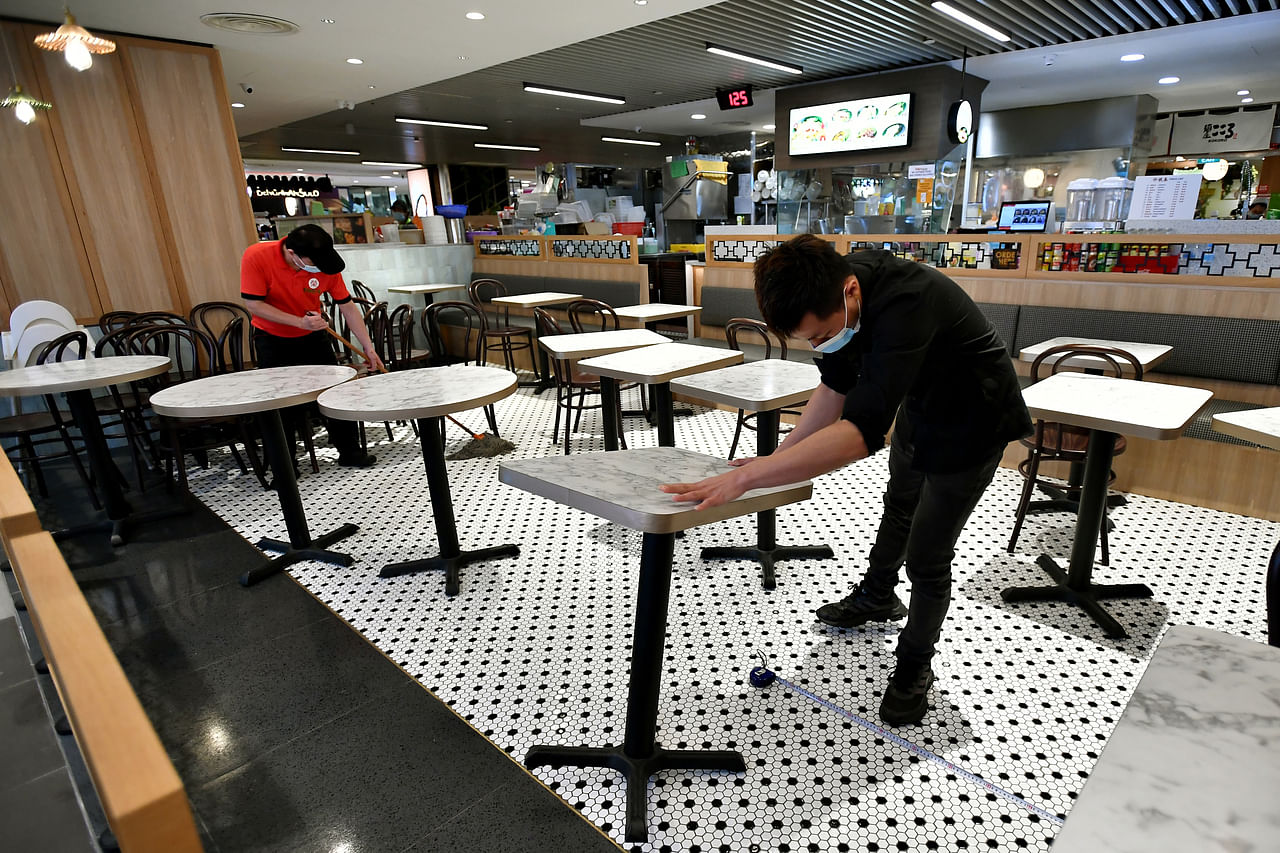F&B players gear up for mandatory Covid-19 testing regime
SINGAPORE – Dine-in food and beverage (F&B) establishments are making arrangements for their staff to get tested for Covid-19 regularly, with some sending their employees for training to learn how to administer tests.
While F&B players expect that the testing requirement will add to operational costs, they are taking steps such as sourcing test kits to adhere to the new measure.
This comes as dining in at F&B outlets resumes from Monday (June 21) with a group size limit of two people.
Regular fast and easy testing (FET) will be mandatory from around mid-July for staff in higher-risk settings such as dine-in F&B establishments and gyms and fitness studios, as well as in personal care services such as facial services and spas, where clients are unmasked, the Ministry of Health (MOH) announced last Friday.
Some larger F&B operators will be starting their testing regime earlier.
A spokesman for fast-food chain McDonald’s said its employees will be sent for training and it will begin to receive test kits from next week. It plans to kick-start regular testing on June 28.
A spokesman for Tung Lok Group said one of its in-house trainers has completed the training to supervise antigen rapid test (ART) self-swabs, with the rest of its staff scheduled to undergo training on Monday.
The restaurant group will implement regular testing once its staff are properly trained and it has received its test kits, he added.
“If this testing is what it takes to keep our restaurants open and give customers peace of mind stepping into our dining spaces, we definitely welcome it,” he said.
MOH said last Friday that some F&B establishments have sent their employees for training and are ready to implement regular testing on Monday.
It noted that more quick test centres will be progressively set up, with one each in Tekka and Yishun to be operational from Monday. These will support small businesses that are unable to organise supervised self-swabs on their own, the ministry added.
The Straits Times has contacted MOH for more details on the training programme.
The McDonald’s spokesman said that while the company supports the move to test F&B staff regularly, especially as vaccination coverage is not yet widespread, the testing regime is rather challenging operationally, given that the fast-food chain’s staff work in shifts and many of them are part-timers.
It is looking at how it can systemically administer tests as well as track and report results, and is encouraging its staff to get vaccinated.
“We would also appreciate clarity on how long this mandatory FET is expected to last, as having to get tested regularly in the longer term could discourage people from working in the F&B industry, which at the moment is already facing manpower challenges,” the spokesman said, adding that there are also concerns about bearing the extra cost of tests amid rising costs and slowing business in the F&B industry.
mopping the floor inside Eng’s Heritage restaurant at Plaza Singapura on June 20, 2021. ST PHOTO: LIM YAOHUI
Mr Victor Tay, chairman of White Restaurant, said it will be training its staff to administer ARTs on their own to reduce time wasted in travelling to and waiting at quick test centres.
“However, at the moment we are still unsure if our staff are receptive to doing it themselves,” he said.
He pointed out that testing the restaurant chain’s 150 front-line staff every two weeks will bring about a substantial additional cost, especially with the reduction in revenue amid higher delivery costs.
“F&B operators will no doubt be concerned about the cost of the test kits over a period of time, especially chain restaurants where staff headcounts are huge,” he said.
A spokesman for restaurant chain Crystal Jade said it has plans to facilitate the testing regime and has contacted the authorities for details on the testing procedures.
“In the meantime, we are sourcing quotes from different suppliers of test kits, as we are looking at making bulk purchases for our front-line staff – over 500 of them – and we need to ensure we have a consistent supply of test kits,” the spokesman said.
Similarly, Greek restaurant Bakalaki’s general manager George Kokkinis is waiting for further guidelines from the authorities on how testing operations should be carried out.
He added that the restaurant will be sending its staff to the quick test centres until they are trained to do self-swabs.
Mr Gunawan Hadi, acting general manager of Spanish fine dining restaurant Alma by Juan Amador, said six of its customer-facing service staff will be getting tested first by the end of this month, with the rest of its 15 employees to get tested from July.
The restaurant is waiting for more information from MOH on the provision of test kits.
“The testing requirement is a good initiative, as dining in is considered a higher-risk activity. While operating costs will be higher, this is the right thing to do,” he said.
Source: Read Full Article



